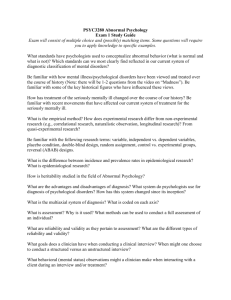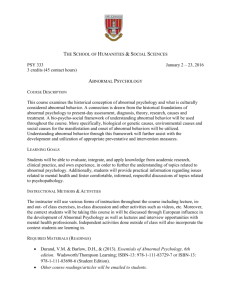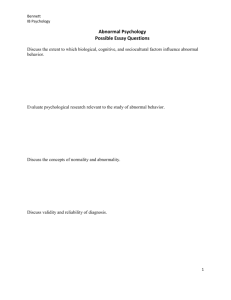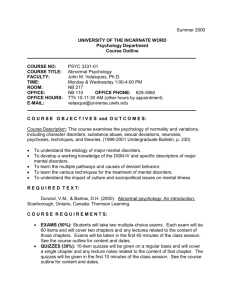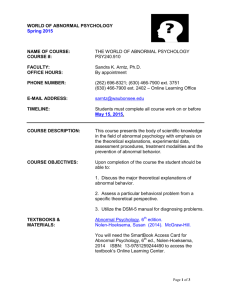ABNORMAL PSYCHOLOGY – CLP3144
advertisement
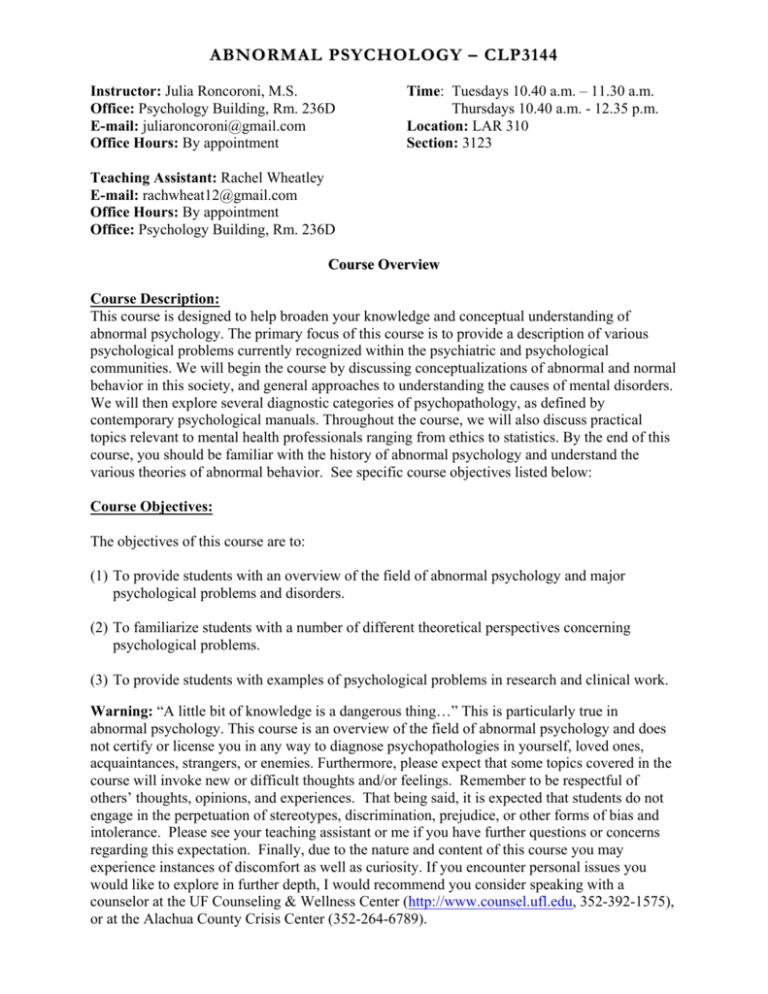
ABNORMAL PSYCHOLOGY – CLP3144 Instructor: Julia Roncoroni, M.S. Office: Psychology Building, Rm. 236D E-mail: juliaroncoroni@gmail.com Office Hours: By appointment Time: Tuesdays 10.40 a.m. – 11.30 a.m. Thursdays 10.40 a.m. - 12.35 p.m. Location: LAR 310 Section: 3123 Teaching Assistant: Rachel Wheatley E-mail: rachwheat12@gmail.com Office Hours: By appointment Office: Psychology Building, Rm. 236D Course Overview Course Description: This course is designed to help broaden your knowledge and conceptual understanding of abnormal psychology. The primary focus of this course is to provide a description of various psychological problems currently recognized within the psychiatric and psychological communities. We will begin the course by discussing conceptualizations of abnormal and normal behavior in this society, and general approaches to understanding the causes of mental disorders. We will then explore several diagnostic categories of psychopathology, as defined by contemporary psychological manuals. Throughout the course, we will also discuss practical topics relevant to mental health professionals ranging from ethics to statistics. By the end of this course, you should be familiar with the history of abnormal psychology and understand the various theories of abnormal behavior. See specific course objectives listed below: Course Objectives: The objectives of this course are to: (1) To provide students with an overview of the field of abnormal psychology and major psychological problems and disorders. (2) To familiarize students with a number of different theoretical perspectives concerning psychological problems. (3) To provide students with examples of psychological problems in research and clinical work. Warning: “A little bit of knowledge is a dangerous thing…” This is particularly true in abnormal psychology. This course is an overview of the field of abnormal psychology and does not certify or license you in any way to diagnose psychopathologies in yourself, loved ones, acquaintances, strangers, or enemies. Furthermore, please expect that some topics covered in the course will invoke new or difficult thoughts and/or feelings. Remember to be respectful of others’ thoughts, opinions, and experiences. That being said, it is expected that students do not engage in the perpetuation of stereotypes, discrimination, prejudice, or other forms of bias and intolerance. Please see your teaching assistant or me if you have further questions or concerns regarding this expectation. Finally, due to the nature and content of this course you may experience instances of discomfort as well as curiosity. If you encounter personal issues you would like to explore in further depth, I would recommend you consider speaking with a counselor at the UF Counseling & Wellness Center (http://www.counsel.ufl.edu, 352-392-1575), or at the Alachua County Crisis Center (352-264-6789). Required Books: Nolen-Hoeksema, S. (2011). Abnormal Psychology (5th Ed.). New York: McGraw Hill. **Additional readings may be assigned periodically throughout the semester. These readings will be announced in class, and will also be posted to e-Learning** E-Learning System Materials and Procedures: The course website can be found at http://lss.at.ufl.edu (e-Learning). You are expected to regularly check this site for information related to the course. Here you will find relevant information and announcements regarding grades, and upcoming assignments and exams. Additionally, slides with minimal notes will be posted on e-Learning prior to class each day so that you are able to follow along in lecture. Please note that these slides should not replace notetaking, and they serve only as an outline for material covered in class that day. Course Requirements Attendance: Regular class attendance and participation are required in this course. Students are expected to know (and will be tested on) material that is covered in both the text and in lecture. That is, students are responsible for all material discussed in class and covered in the assigned readings. Slides with minimal information will be posted on Sakai for your convenience in taking notes and to help you follow along during class. These slides are not sufficient preparation for exams, and students are expected to take notes during lecture to supplement these slides. Students are responsible for meeting course requirements on the dates outlined in the course syllabus. Evaluation Criteria: Quizzes: (10 points each; 50 points total) There will be a total of seven unannounced in-class quizzes throughout the semester that will take place at some point during the class meeting time. Quizzes may be administered at either the beginning or end of the class meeting time. These quizzes will test basic concepts covered in both the textbook and in lecture, and may take a number of different forms (e.g., multiple choice, short answer, in-class activity, etc.). Therefore, these quizzes are designed to help you stay on top of the reading and to attend and actively participate in class. At the end of the semester, the two lowest quiz scores will be dropped. If you miss a quiz, you will be able to make-up the quiz only if you are able to provide documentation of your excused absence. You may only take the quiz no later than 1 week after the missed quiz or your return to class. No make-up quizzes will be given after one week has passed. Exams: (100 points each; 300 points total) There will be three (3) exams worth 100 points each given on the dates noted in the class schedule. Exams will consist of a multiple choice portion as well as a short answer portion. Exams will cover lecture (including videos and activities), textbook material, and any additional assigned readings. All exams are non-cumulative. Exams will be taken in class and will be closed book. It is strongly recommended that you come to class on time for exams. If you come late and begin the exam, you must turn it in at the end of the test time. If you arrive late and another student has already finished the exam and left the classroom, you will not be allowed to take the exam. Abnormal Psychology - CLP3144, Section 3123 Spring 2013 2 Only under extreme circumstances (e.g., death of a close family member, serious illness, natural disaster, etc.) or for university-approved absences will administering a make-up exam be considered. Please contact me as soon as you know you will be missing an exam to discuss your reasons for missing the exam and to discuss the possibility of a make-up exam. To make up an exam, documentation of your excused absence must be turned in, and you must take the exam no later than 1 week after the missed exam or your return to class. Critical Thinking Paper: (100 points total) Each student will write one critical thinking paper worth 100 points. The paper will conform to the following formatting standards: 3-4 pages, double-spaced, 1 inch margins, size 12 point Times New Roman font. More detailed information about the paper topic will be provided in class. A hard copy of the paper must be submitted in class on April 23, 2013. No late submissions will be accepted, unless extenuating circumstances are documented (in which case both paper and documentation will be required). Papers will be turned in both: (a) electronically, through Sakai; and (b) in hard-copy, to the Julia’s box in the Psychology building (Rm 114). There will be NO paper re-writes, nor will you be allowed to write an additional paper to replace a grade with which you are not satisfied. Extra Credit: (up to 20 points) Throughout the semester, some extra credit opportunities (e.g. in class activities, research participation, etc.) may be presented to the class. These opportunities will be presented to all students in the class, at the discretion of the instructor. Grading: Points can be earned as follows, and grades will be assigned according to the scale listed below. If you have additional questions about grades at the University of Florida, please see the information at the following web address: https://catalog.ufl.edu/ugrad/current/regulations/info/grades.aspx In-Class Quizzes 50 pts 11% Exams 300 pts 67% Midterm 1 100 pts 22% Midterm 2 Final Exam 100 pts 100 pts 22% 22% Critical Thinking Paper 100 pts 22% Extra Credit 4.4% +20 pts Total points in course: 450, with the ability to earn 20 points of extra credit. Percentages for this course correspond to the following letter grades. A A- B+ B B- C+ C C- D+ D D- E 93-100 90-92 87-89 83-86 80-82 77-79 73-76 70-72 67-69 63-66 60-62 0-59 419450 405418 392404 374403 360373 347359 329358 315328 302314 284301 270283 0-269 Abnormal Psychology - CLP3144, Section 3123 Spring 2013 3 Essential Class Information Policy The Learning Environment: Please cooperate with me and your fellow students to create an environment that fosters learning and communication. We all should be respectful in our behavior and comments, and should eliminate disruptions that might be distractions. Disruptions to the learning environment include (but are not limited to): talking while others are speaking, reading newspapers, magazines, or unrelated course material in class, use of personal electronic devices during class (e.g., iPods, text messaging, etc.), eating disruptively in class, or otherwise behaving rudely. I understand that on rare occasions it might be necessary to either arrive to class late or to leave early. I do prefer that you come to class on those occasions when you must be a little late or leave a little early, rather than not attend at all. However, make every effort to avoid this if possible. On those occasions when it is necessary, please do so with as little disruption to the class as possible (e.g., take a seat near the door and enter/depart quietly). Cell Phone Policy Use of cell phones or other electronic devices is particularly disruptive and will therefore not be tolerated. It is NOT sufficient to set your phone on silent or to vibrate; devices MUST be turned off and stored out of sight. If, for any reason, you must text or make a call during class, please step out to the hallway to do it. Devices must absolutely be turned off and kept out-ofsight during exams Computer Policy Computer use is only allowed for class-related purposes. If either TA or I see a student using a computer for non-class purposes, we will ask the student to discontinue the use of the computer for the remainder of the class time. If this occurs again with the same student, the student will directly be asked to leave the class. If either TA or I must ask the class to not use the computer for class-unrelated purposes more than three times during the semester, computer use will not be allowed for the remainder of the course. Non-class related computer use is distracting to me and other students. Repeated violations of either of these policies may result in a reduction of your final grade. Attendance: I respect the fact that you have a life outside of this class. Therefore, there will not be an official attendance policy, though attendance is strongly encouraged. I am more concerned about you learning class material. Therefore, if you choose not to attend class, you may miss graded in class assignments, information regarding upcoming tests, and further explanation of difficult concepts. You will not be able to make up in-class assignments without written documentation of your absence (e.g., doctor’s note, etc.). If you are unable to attend class, feel free to contact a classmate regarding missed material. You are responsible for the work that you missed. ADA Policy: If you are a student with a disability and would like to request disability-related accommodations, you are encouraged to contact me and the Disability Resource Center as early in the semester as possible. The Disability Resource Center is located in 001 Building 0020 (Reid Hall). Their phone number is 392-8565. Abnormal Psychology - CLP3144, Section 3123 Spring 2013 4 University of Florida Student Honor Code: The University of Florida Student Honor Code outlines the University’s expectations for the integrity of students’ academic work, the procedures for resolving alleged violations of those expectations, and the rights and responsibilities of students and faculty members throughout the process. Students are responsible for reading the Student Honor Code and for living up to their pledge to “hold ourselves and our peers to the highest standards of honesty and integrity.” (University of Florida Student Honor Code, found at http://regulations.ufl.edu/chapter4/4017.pdf). I will pursue any violations of this policy to the fullest extent possible. A Note on Plagiarism: Plagiarism will result in a reduction of your grade, including and up to a failed grade in this course. I line with UF policy, I will report any known instances of plagiarism to the Dean of Students office, and you will have a UF honor code file with them for the remainder of your time at UF. Plagiarism includes but is not limited to “1) quoting oral or written materials including but not limited to those found on the internet, whether published or unpublished, without proper attribution, 2) submitting a document or assignment which in whole or in part is identical or substantially identical to a document or assignment not authored by the student” (Regulations of the University of Florida, 2012). If you have any questions regarding what plagiarism is, or looks like, please contact the teaching assistant or me as soon as possible. Extra Help and Additional Topic Information: Contact me as soon as possible for extra assistance if you discover you are having trouble. I will gladly reserve time to meet with you if necessary. For those interested in additional information regarding any topic discussed in class, I am available at any time to recommend additional resources to you if you wish to explore this material in greater depth. Religious Observances: Please check your calendars against the course syllabus. Any student having a conflict in the exam schedule, or feel that they will be disadvantaged by missing a class due to religious observance, should contact me as soon as possible so that we can make any necessary arrangements. Copyright Statement: Some of the materials in this course are possibly copyrighted. They are intended for use only by students registered and enrolled in this course and only for instructional activities associated with and for the duration of the course. They may not be retained in another medium or disseminated further. They are provided in compliance with the provisions of the Teach Act. Syllabus Change Policy: Except for changes that substantially affect implementation of the evaluation statement (i.e., grading), this syllabus is a guide for the course and is subject to change with advance notice. Abnormal Psychology - CLP3144, Section 3123 Spring 2013 5 Week 1 DATE Jan 8 COURSE ACTIVITIES Course Introduction Jan 10 Guest Speaker: Looking at Abnormality Chapter 1 Week 2 Jan 15 Jan 17 Chapter 2: Theories and Treatment of Abnormality Chapter 2 Week 3 Jan 22 Chapter 4: The Research Endeavor Chapters 3 & 4 Jan 24 Chapter 3: Assessing and Diagnosing Abnormality - Week 4 Jan 29 Jan 31 Chapter 5: Anxiety Disorders Chapter 5 - Week 5 Feb 5 Chapter 6: Somatoform and Dissociative Disorders MIDTERM (Chapters 1-5) Chapter 6 Chapter 7: Mood Disorders and Suicide Chapter 7 Chapter 8 Feb 21 Chapter 8: Schizophrenia and Related Psychotic Disorders Feb 26 Chapter 9: Personality Disorders Chapter 9 Feb 7 Week 6 Week 7 Week 8 Feb 12 Feb 14 Feb 19 Feb 28 Week 9 READINGS/ASSIGNMENTS - Study, study, study! - - ** SPRING BREAK ** Week 10 Mar 12 Chapter 10: Childhood Disorders Chapter 10 Mar 14 MIDTERM (Chapters 6-10) Study, study, study! Week 11 Mar 19 Chapter 11 Mar 21 Chapter 11: Cognitive Disorders and Life-Span Issues Week 12 Mar 26 Chapter 12: Eating Disorders Chapter 12 Week 13 April 2 Week 14 April 9 Week Mar 28 - Chapter 13: Sexual Disorders April 4 Chapter 13 Chapter 14 April11 Chapter 14: Substance-Related and Impulse-Control Disorders April 16 Guest Speaker: Health Psychology Chapter 15 - Abnormal Psychology - CLP3144, Section 3123 Spring 2013 6 15 April 22 Chapter 15: Health Psychology - Week 16 April 23 Chapter 16: Mental Health and the Law Chapter 16 April 25 Reading Day Week 17 April 30 Critical Thinking Paper Due FINAL EXAM **Schedule is subject to change with prior notice from the instructor** Abnormal Psychology - CLP3144, Section 3123 Spring 2013 7
